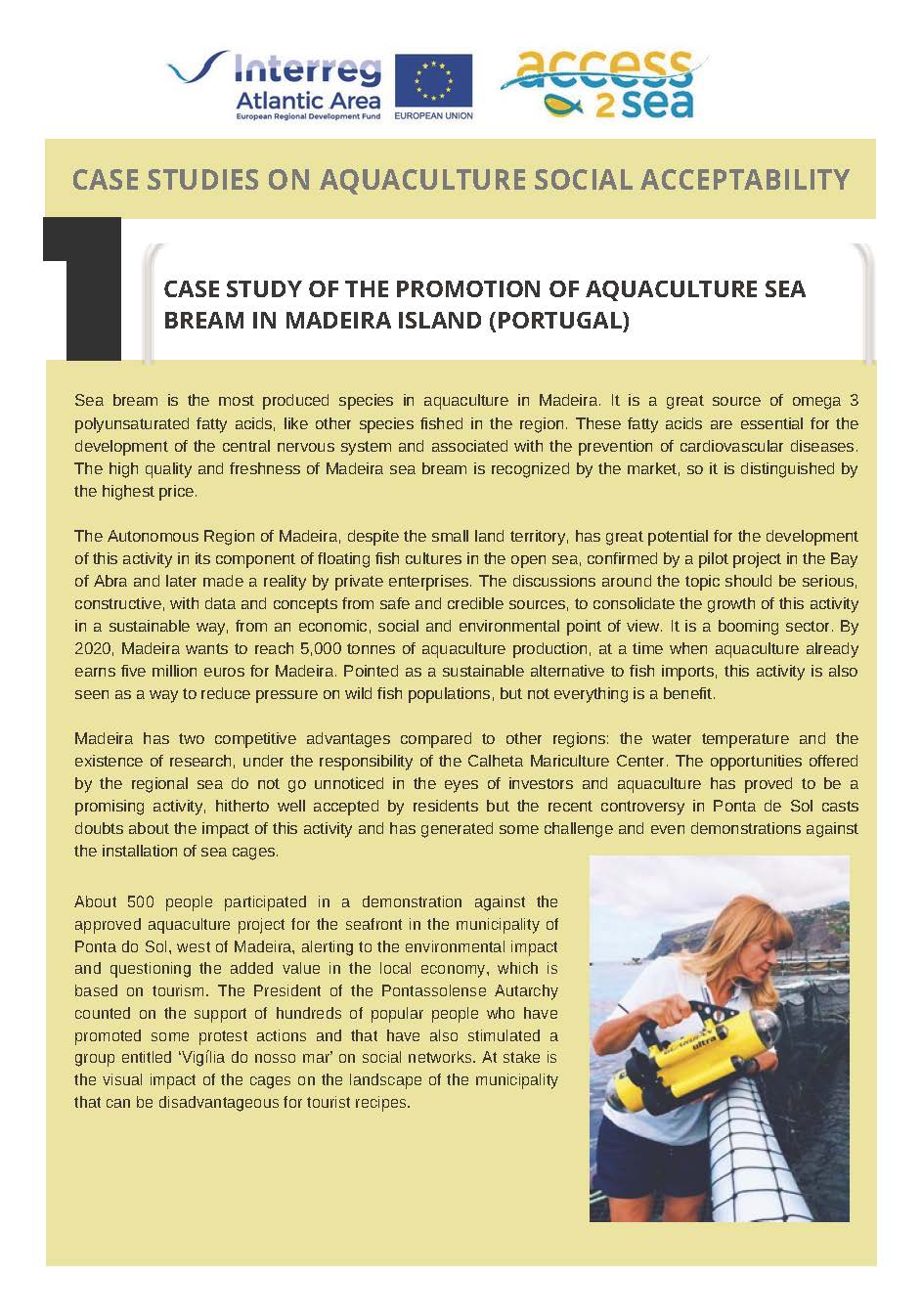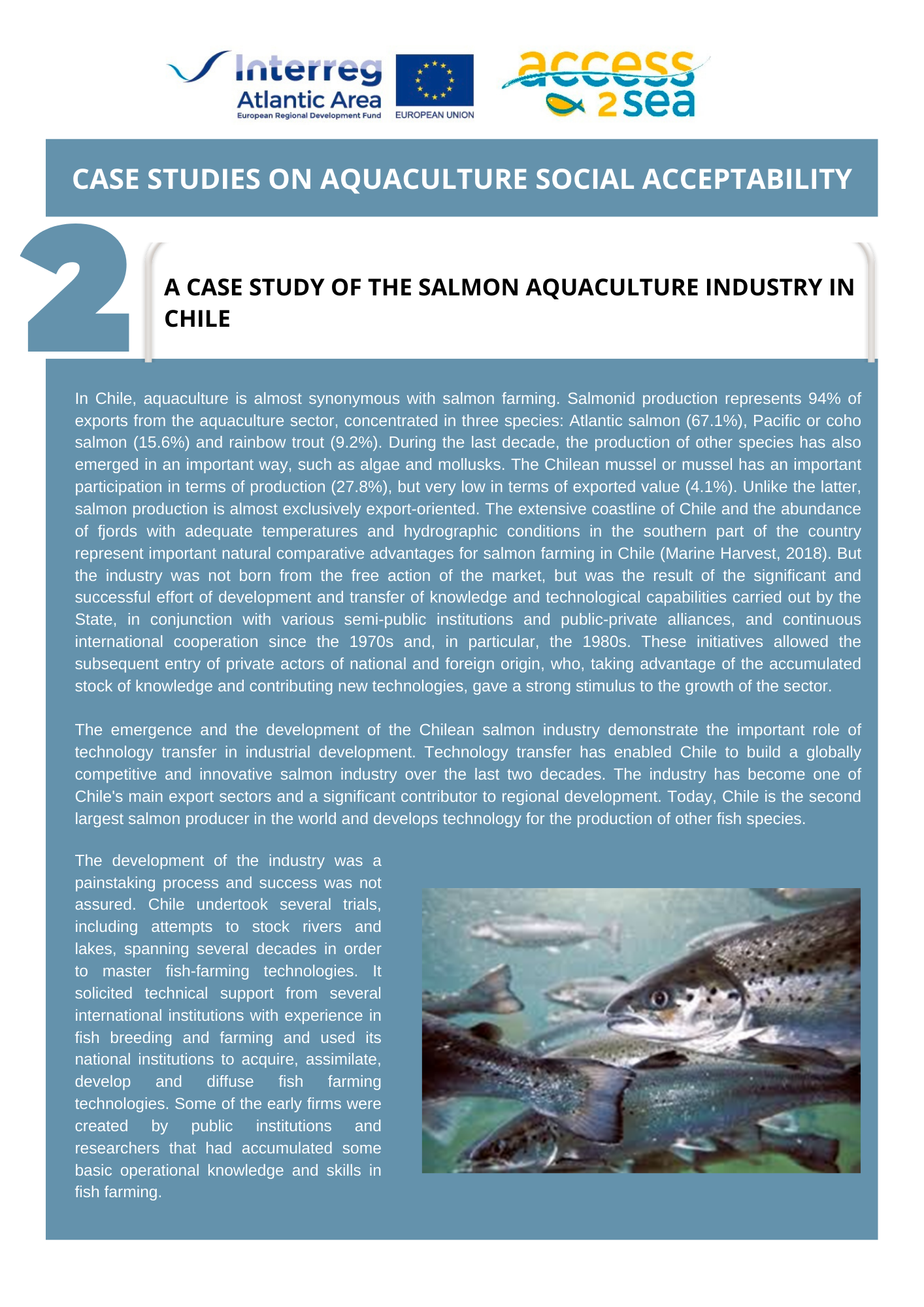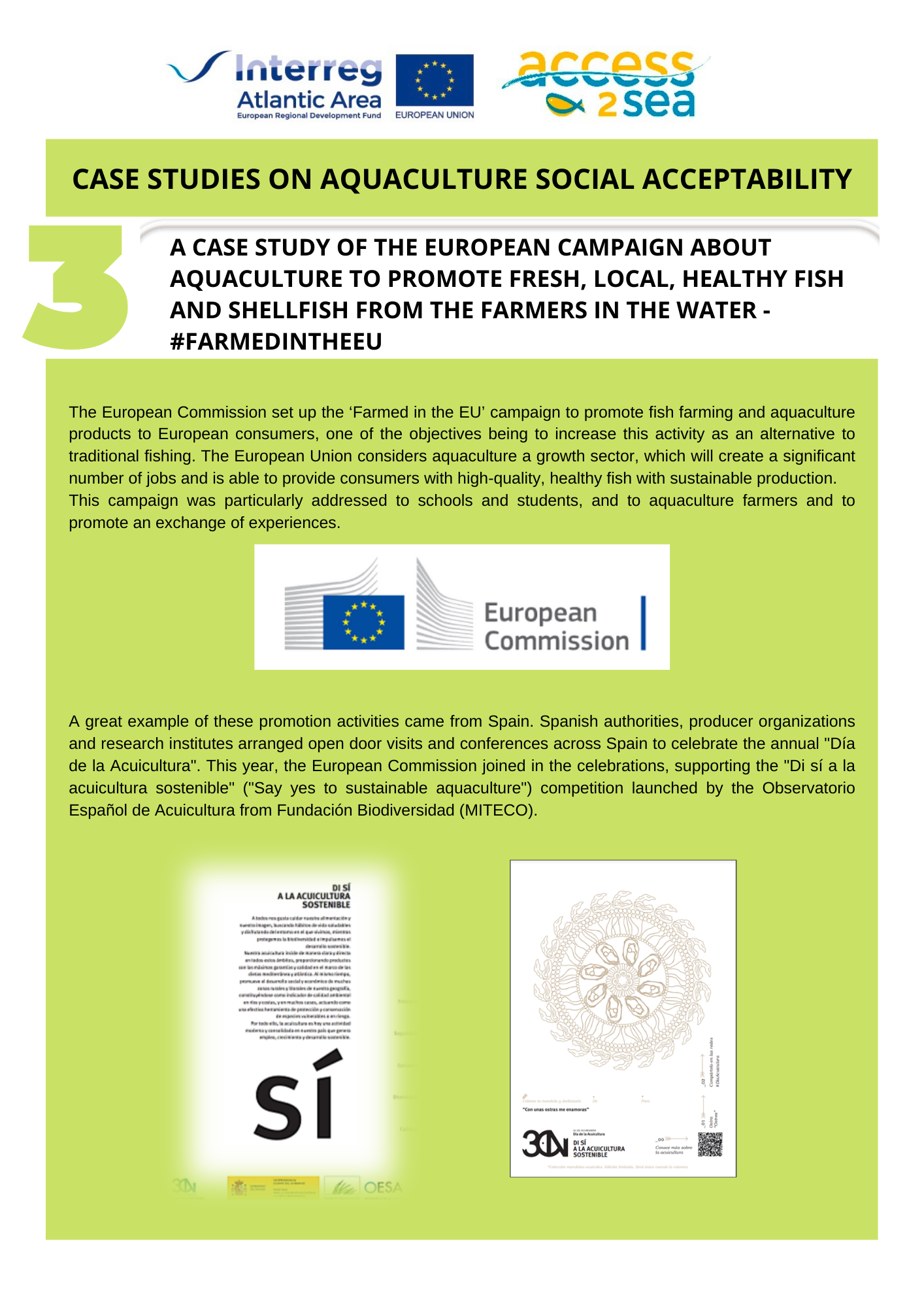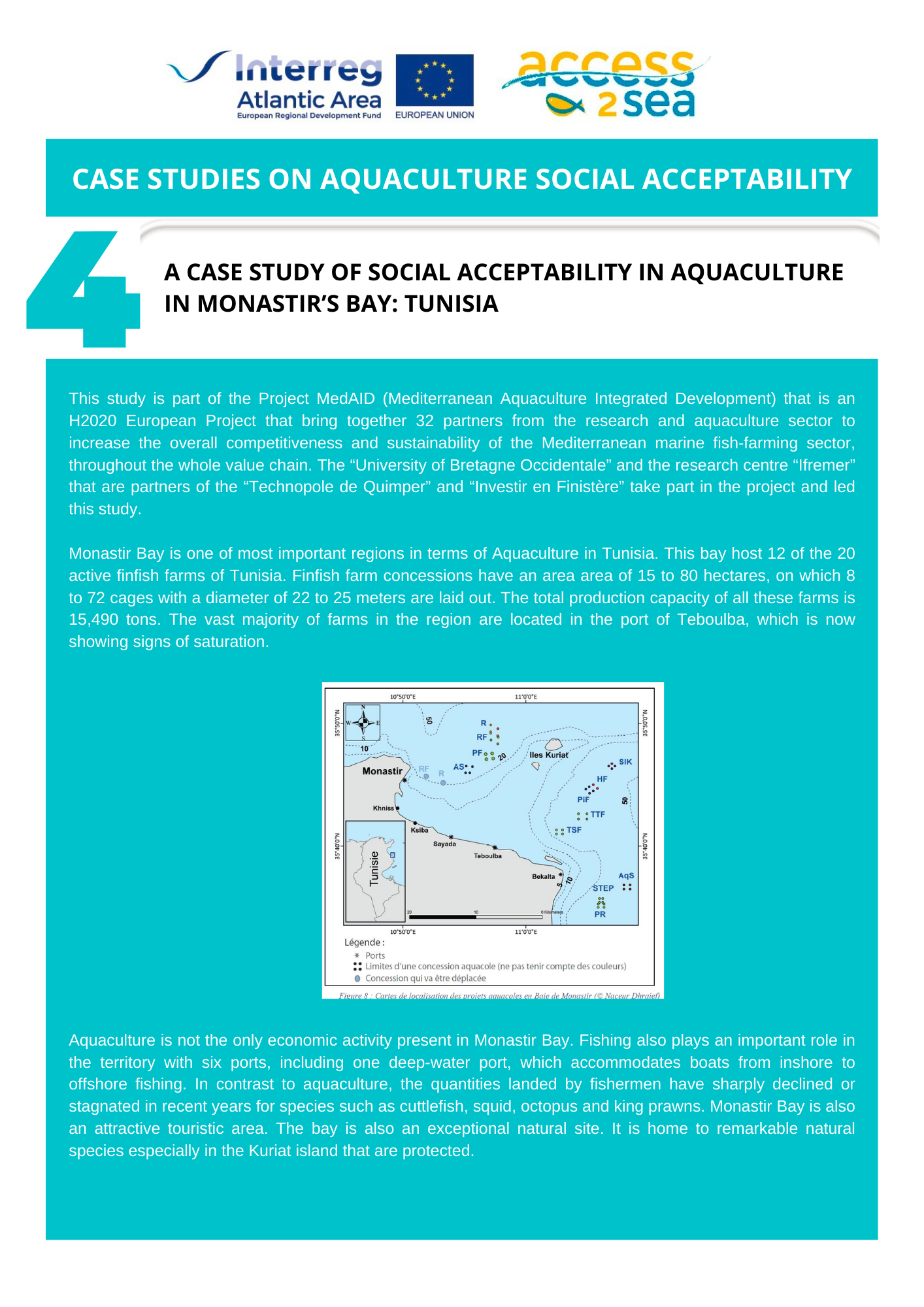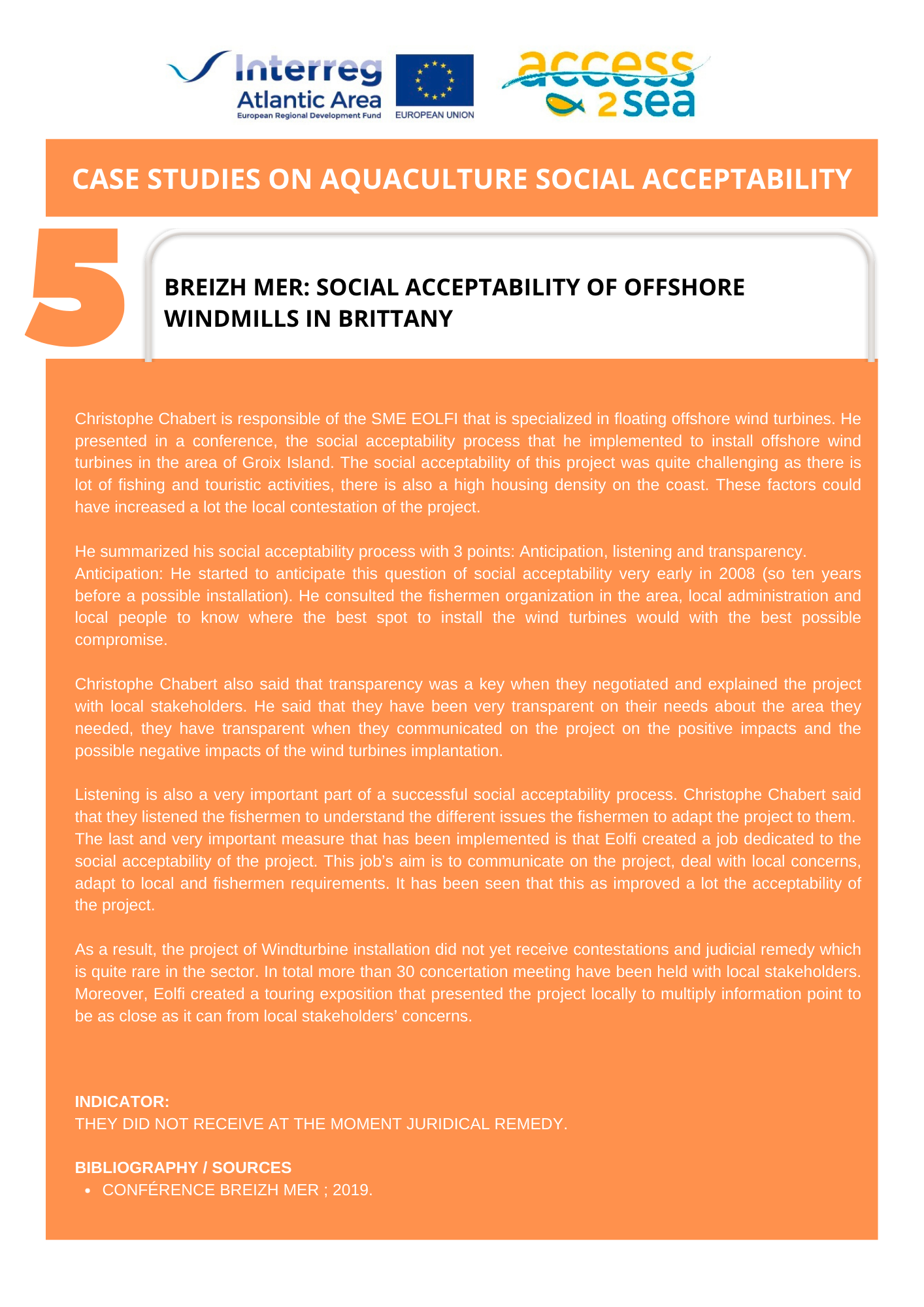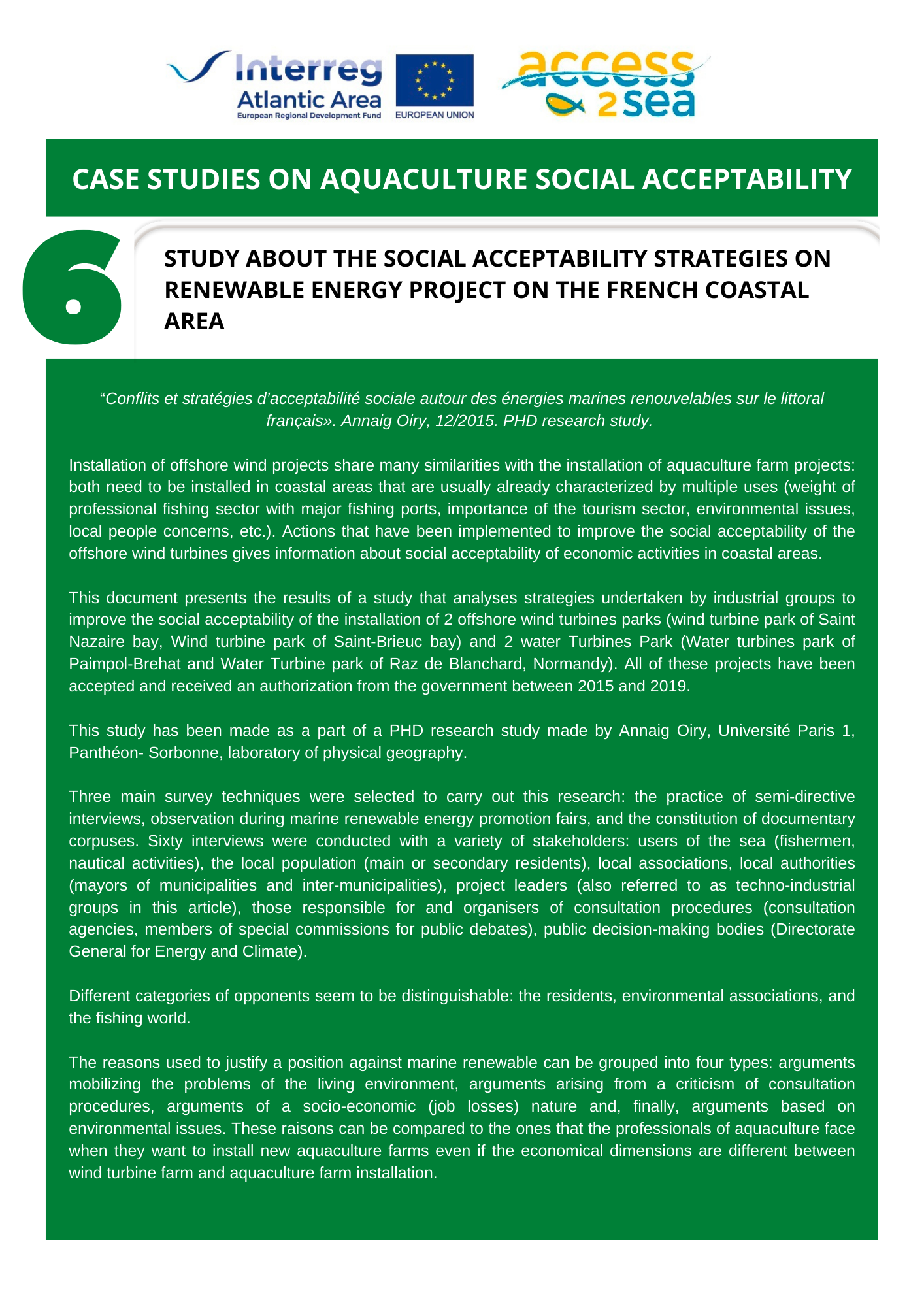Section 2. Project Communication

In this section, the different Communication Material produced to disseminate Access2Sea can be downloaded:
- Access2Sea Leaflet:
- Access2Sea A3 Poster:
- Access2Sea Folder:
- Access2Sea Rollup Banner:
- Access2Sea Branding Manual:
- Access2Sea Communication Plan:
- Access2sea Infography 1:
- Access2sea Infography 2:
- Access2sea Infography 3:
- Access2sea Final Results Report:

Section 3. Capitalization
Access2Sea Capitalization Strategy is based on 3 pillars:
- The knowledge available that could feed Access2sea from previous projects and other initiativies or strategies.
- The Local Follow Up Committees that have been created to follow up and evaluate different methodologies, procedures and actions to be implemented in their regions.
- The Action for Change Action Plan, which will formally presented and signed by partners at the end of the project, which will define local actions to strenghten the sustainability of the project results.
- Capitalization of available Knowldge
During the first months of the project implementation period, partners have been working on a Capitalization of available knowledge. The result of this work has been compiled in the following report:
2. Access2sea Action for Change Position Paper
At the end of project, the Access2sea project partner Údarás na Gaeltachta, in collaboration with the rest of partners, has produced a position paper based on project conclusions and results to continue supporting the project territories in the mentalities and political changes required by a sustainable aquaculture sector as well as supporting other Atlantic Area territories in developing sustainable aquaculture activities that are socially accepted and recognized as an added value for local development. The Access2sea Action for Change Position Paper produced can be found clicking in the following link:
Section 4. Space Planning to Foster Aquaculture Activities
- IEF Methodology Transfer
One of the objectives of Access2Sea is to deal with the spatial planning: the problematic, building and validation of a common Access2Sea methodology (jointly developed by all the partners).
To achieve this, Access2Sea Partners have been working on a Diagnosis of the current situation in their territories in connection to Spatial planning.
This information was presented during a Transnational Workshop held in Brest, in October 2019 where all the partners and some local stakeholders attended. The conclusions of this workshop were gathered in the following report:
- Knowledge transfer transnational Workshop. Conclusions Report.
- Annex 1: Methodology implemented by “Investir en Finistère”, Brest (France)
- Annex 2: Methodology implemented by “Investir en Finistère”, Brest (France). Part 2.
- Annex 3. Authorization Process Onshore and Offshore. Finistère (France)
- Annex 4. Space Planning in Andalucia (Spain)
- Annex 5. Space Planning in Portugal
- Annex 6. Space Planning in Wales (UK)
2. Access2Sea Methodology and Indicators Board
Taking into account the results of the previous action, partners have collected data and information about their territories aiming at comparing and sharing each one spatial planning framework. They individually produced a state of art report about their their own reality following a similar structure to allow data comparison. Based on the reports, the workpacket leader have designed a common methodology and common indicators board Atlantic Area partners, have assed the relevancy of shared tool for onshore and offshore sites.
A State of the Art Report with information collected from each of the territories involved in the project has also been written, following a structure that allows the comparison of the situation on each of the territories.
This report is available and and can be downloaded by clicking here:
3. Assessment of the transferability of partner’s Best Practices related to Aquaculture Space Planning: Access2Sea Best Practice Monograhic
Monographic document describing the best practices identified in the project territories.
Access2sea partners have shared their knowledge, methodologies, and experience in relation to the existing MSP tools available, making diagnosis of the starting situation, identifying the most relevant practices that can permit to maintain and develop aquaculture activities, propose spatial planning tools to improve the access to the sea for aquaculture producers and the possibility of transferring them to other Atlantic Area regions.
Section 5. Developing Social Acceptability Methods
One of the main obstacles to develpment of aquaculture activities is the low social acceptance these activities and its promoters have for the local coastal communities.
Access2Sea partners are working to assess the state of play of the social acceptnce level of aquaculture in the project territories and identify methodologies and initiatives that had proven to be efficient in improving social acceptance in order to develop an “Access2Sea Social Acceptance Strategy”.
- Current state of the difficulties.
The first step to the achieve an “Access2Sea Social Acceptance Strategy” has been identifying the main social difficulties and obstacles that aquaculture activities face.
The result of this assessment has been included in a “State of Play Report”, with the data collected by all partners in their regions.
2. Inventory of new consultative initiatives to improve the social acceptability
Access2Sea Partners have worked on the elaboration of an inventory of new iniatives and methodologies to improve social acceptability in aquaculture.
As result of this, 6 Case Studies of good practices were identified. These Case Studies encompass different aquaculture sepcies and marine development projects and geographical regions and resultad in valuable lessons.
You can read the Case Studies here:
3. Access2sea Social Acceptability Strategy
Access2sea partner have worked in the elaboration of a strategy with some actions and methodologies that can be implemented to improve social acceptability. This strategy is based in information that has been gathered with the collaboration of the Access2sea partners and their stakeholders. Here below it can be found the report produced as result of this work.
Two of the actions identified in this strategy have been implemented during the project implementation period:
- Pilot Project #4: Lump Fish Welfare Watcher.
- Implementation of a Social Acceptability Campain in Cádiz (Spain): #YoComproProductosdeAcuicultura (I buy Aquaculture Products)
Section 6. Business Models Building for aquaculture farms

One of the aims of Access2Sea is to improve the business environment and the growth and jobs creation of the aquaculture sector in the project territories. In this section you can find the documents produced by the partners to achieve this aim:
1 Aquaculture SMEs Inventory
In their territories, the partners have carried out an inventory of the aquaculture companies established there to characterize their business model. The inventory has followed a common template to obtain a joint database that will be used to assess the degree of development and if there is any type of sectoral specialization of the aquaculture sector in the project regions and will be used as input for future actions of the project.
A report identifying and characterizing the aquaculture sector existing companies for the project territories can be read in the following link:
2. Regulatory and legislative frameworks inventory
The partners have characterized the regulatory and legislative frameworks of the project territories for the granting of licenses aquaculture farms on land and offshore (based on pre-existing studies) and has evaluated the Socio-economic impact on the coastal communities of the Atlantic zone. This analysis has been carried out following a template to allow comparison of data and develop an inventory of regulatory and legislative frameworks (highlighting best case models).
Here below, a report identifying and characterizing regulatory and legislative frameworks inventory in each of the Atlantic Regions involved can be found, as well as a common report with the project advancement in this field.
- Regulatory and legislative frameworks inventory – Overall Region
- Regulatory and Legislative Frameworks – Andalucía Region
- Regulatory and Legislative Frameworks – Brittany Region
- Regulatory and Legislative Frameworks – Irish Region
- Regulatory and Legislative Frameworks – Welsh Region
- Regulatory and Legislative Frameworks – Portuguese Region
3. Access2Sea Business Models
Based on the results of the previous actions partners will jointly identify the successful business models in place to be the base for developing the Access2Sea Business Models (ABM). They should allow the transfer of technical methods & represent legal solutions to overcame business constrains. ABM will be based on alternative sustainable business models like Community Entreprise Solutions & Social Entreprise Management Solutions. The guidelines for the models “usage” (road map) will be developed.
4. Inventory of new sustainable aquaculture techniques
The Access2Sea Project Partners have carried out a reserch and analysis of the new aquaculture techniques that are being developed at EU level, aiming at fostering a more sustainable industry, making a joint inventory of those which can answer to the needs and can be applied to the project territories companies, as well as develped a road map to support the technology transfer process.
Here below, a report identifying and characterizing new sustainable aquaculture techniques in each of the Atlantic Regions involved can be found, as well as a common report with the project advancement in this field.
- New Sustainable Aquaculture Techniques – Overall Report
- New Sustainable Aquaculture Techniques – Andalucía Region
- New Sustainable Aquaculture Techniques – Brittany Region
- New Sustainable Aquaculture Techniques – Irish Region
- New Sustainable Aquaculture Techniques – Welsh Region
- New Sustainable Aquaculture Techniques – Portuguese Region

Section 7. Pilots Project

PILOT PROJECT IMPLEMENTATION
Based on the results of the different Work Packages, Access2sea partners will continue working together, sharing their knowledge, experiences, methodologies and tools, to develop project pilots that provide answers to the different key fields of the project:
- take advantage of business opportunities detected
- support the sustainable aquaculture activities (new and existing)
- improve the social acceptance of those activities
You can read more about the 5 different pilot projects here:
- Access2Sea experimental approach to expertise new aquaculture sites.
2. Aquaculture Activities instalation Pilot Project (Spain)
3. Sustainable Aquaculture Activities Pilot Project (Ireland)
4. Aquaculture Activities for Social Acceptance Pilot Project (United Kingdom)
5. Feed Intake Regulation as a Tool for Waste Management in Fish Production (Portugal)
PILOT PROJECT RESULTS
One of the aims of Access2Sea is to improve the business environment and the growth and jobs creation of the aquaculture sector in the project territories. Through this section, the main results of the technical reports developed and implemented in each of the Pilot Projects carried out in each of the regions will be presented with the main objective of disseminating the results obtained.
- Access2Sea experimental approach to expertise new aquaculture sites.
How to set up an onshore aquaculture site with seawater supply?
Investir en Finistère with its partner Technopole de Quimper Cornouaille and supported by professional federations and experts have just edited a guide to support aquauclture farmes. This methodology book details and explains all the steps to set up a project: from ratio and data to technical and legal indicators. Including practical analysis grids, this document helps to assess the suitability of a site.
This methodology is intended for:
-
- Entrepreneurs who are embarking on an onshore aquaculture project requiring seawater pumping, whether linked to an offshore concession or on their own and concerning different activities: shellfish farming, seaweed cultivation, fish farming, marine biotechnologies according to their specific needs.
- Technicians from public organizations and communities who are supporting a project on their territory or who wish to equip a site.
Here below you can find the Methodological Guide, both in English and French:
- Methodological Guide: “Set up an onshore aquaculture site with sea water supply” – EN
- Guide Méthodologique: Installer unsite aquacole à terre avec desserte eau de mer – FR
2. Aquaculture Activities Installation Pilot Project
The aim of this pilot was to test the combination of introducing innovation on existing aquaculture farms, together with the support and improvement of their Business model, through the support of an aquaculture SME, to increase its profitability.
For the development of this Pilot project, an SME selected to test the model through support and follow up both in technical and technological capacity as well as in the application of a profitable business model.
The pilot has been developed in the province of Cadiz (Andalucia – Spain), by the Access2sea partners CTAQUA and CEEI Bahía de Cádiz together in a joint action and the results and knowledge are available here so they can be transferred to other partner regions and beyond.
The Centro Tecnológico de la Acuicultura de Andalucía (CTAQUA) together with Centro Europeo de Empresas e Innovación (CEEI) were cooperating to support the transition toward sustainable aquaculture by assessing both the technical and business model of a company, Tsiane acuicultura multitrofica S.L.U.
For the development of the pilot, after the selection process of Tsiane acuicultura multitrófica, S.L.U., an initial assessment, both technical and related to their their business model was conducted, in order to plan the pilot implementation.
The different trials were developed at Tsiane and in lab conditions using CTAQUA’s facilities in order to improve and implement new cultivation and farming techniques, particularly, Codium cultivation (Codium decorticatum and Codium tomentosum) from protoplasts in lab conditions and feasibility studies of three red algae species (Gracilaria gracilis, Gracilariopsis longissima and Chondracanthus teedei) in earthern ponds, simultaneously with the Business Support provided, in order to improve their business model.
A final report to compile all the results and consider the semi-industrial scale application of these pilot actions at Tsiane was carried out.
CLICK HERE TO SEE THE PILOT REPORT
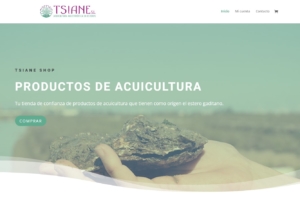
As a result of the business model assessment and the business support provided, one of the conclusions was that the company could improve its business model by introducing a new commercial channel, to reach new markets and also introduce new products, so a very Minimum Viable Product (https
://tsianeshop.es/) was developed to test how the digitalization of the commercial process could make an impact on a small aquaculture producer, so this MVP could be transferred to other producers.
3. Sustainable Aquaculture Activities Pilot Project
This pilot action aimed to:
- provide infrastructure and equipment for the shellfish producers to store their produce giving them an option to either sell directly to wholesalers on the pier side or to store them and sell them directly to consumers thus enabling them to receive a higher value for their produce
- increase the knowledge and skills of the local shellfish cooperative on food safety handling
The project involved the development of a Pilot Enterprise & Development Centre that would give the co-op the opportunity to branch into new markets that are not accessible to them at present.
The Pilot Enterprise & Development Centre will support the co-op’s ability to sell directly to retailers, hotels, and restaurants and to gain access to these markets.
This pilot had the objective of adding value to seafood produce by creating cold storage and processing facilities for the producers where the produce could be stored for a period by producers and sold at an optimum market value directly to consumers. Secure storage enables supply continuity and market access and thereby added and increased value.
The following report contains the description of the pilot project carried out and the results obtained: CLICK HERE TO SEE THE PILOT REPORT
4. Aquaculture Activities for Social Acceptance Pilot Project
The aim of this pilot was to develop tailored tools to monitor and improve the welfare of lumpfish, with the final aim of improving the social acceptability of aquaculture products.
A Lumpfish Welfare watcher a tool was created, that allows fish farmers to monitor and record the welfare of lumpfish and take remedial actions.
Four innovative and complementary solutions , spanning TRL7 and TRL9 have been developed, to help farmers monitor the welfare of lumpfish and take remedial actions:
- A diagnostic welfare scoring chart that can be used by fish farmers on site
- An online BMI calculator to detect underweight lumpfish
- An online Rapid Welfare Assessment tool for lumpfish
- An e-training platform
The tools developed are available for aquaculture farmers to be used in the following link: CLICK HERE TO ACCESS THE TOOL
5. Feed Intake Regulation as a Tool for Waste Management in Fish Production
The aim of Access2sea Pilot Action 5 was to minimize the waste of unconsumed fish feed and reduce the operational costs, by developing a simulation model based on experimental data on some of the regulatory mechanisms of feed intake as a tool for providing information and guidance for the aquaculture stakeholders to minimize waste and reduce production costs.
This tool is the result of an experimental work carried out, planning and executing three fish trials aimed to gather experimental data to ultimately support the development, fitting and validation of a numerical model, foreseeing an optimization of fish intake accordingly to fish weight, water temperature and salinity.
The results of all trials produced a final dataset, subjected to data analysis methodologies, which was finally used to produce the tool that is presented in this link: CLICK HERE TO ACCESS THE TOOL

